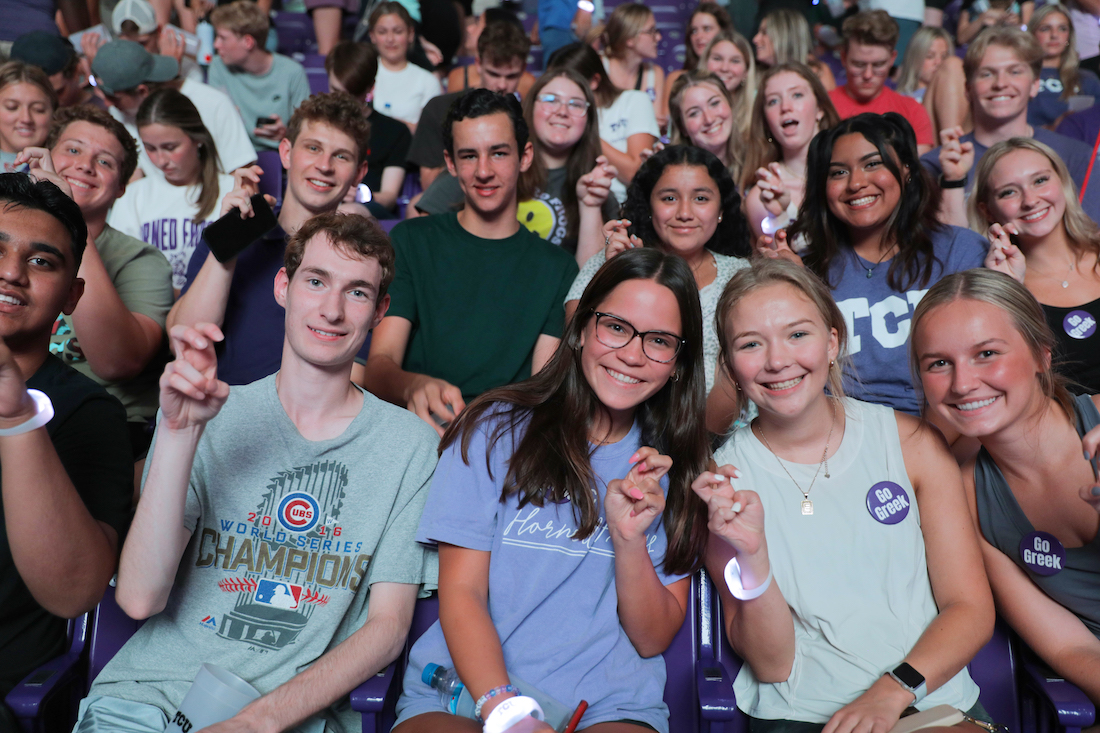
Photo by Amy Peterson
The Class of 2026 Share Their Application Essays
Four members of the Class of 2026 share the essays that helped them secure a place at TCU.
SUZANNA TESFAMICHEAL
Engineering
Fort Worth, Texas
I grew up in a refugee camp called May-Ayni, one of four such camps in Tigray, Ethiopia.
I am one of the lucky ones who made it out.
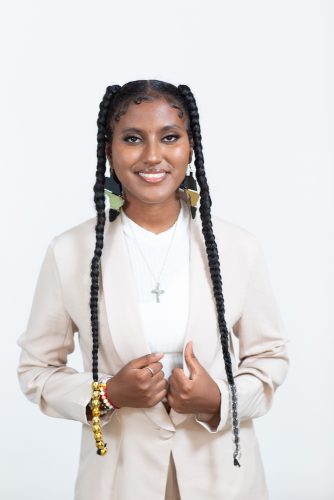
Suzanna Tesfamicheal grew up in a refugee camp called May-Ayni in Tigray, Ethiopia. Photo by Carolyn Cruz
I have seen things that forever changed me. Many people in the camp fled from Eritrea. People arrive at those refugee camps for many reasons, but the common reason at May-Ayni was the Eritrean dictator, Isaias Afwerki.
Eritrean citizens have no freedom; if they try to protest or say anything bad about the government, they will go to jail and live in inhumane conditions or even be tortured. They cannot so much as voice an opinion, so many people leave. Kids as young as 8 sometimes cross the border all by themselves to reach the camps, where people wait a month for basic rations.
The refugee camps are not the best, but they are at least safe. Most of the houses are made of mud; imagine what happens when the rain comes. People who had a little money would build their houses with bricks. This building technique piqued my interest in education and then engineering.
I want to go back to the community and give back to my people, who are suffering. May-Ayni was home to me. Growing up in a place like that helped me figure out my WHY in life. I have an opportunity most of my people did not get. I am going to use this chance to become a person who will give back. This is what matters to me.
HANNAH HELFRICH
Business Information Systems
Nashville, Tennessee
On May 26, 2020, I saved a stranger’s life.
While at a gas station parking lot on a summer afternoon, I noticed a dented, brown Buick surrounded by three men acting strangely. As a woman, I have been taught to be aware of my surroundings. I put the fuel pump in my car, returned to my seat and locked the doors. Once my tank was filled, I replaced the pump. As I was about to leave the station, I stopped cold and did a double take. On the ground next to the car was an unconscious man.
My heart sank, and I got out of the car. Maintaining distance due to the pandemic, I asked the men if they knew how to perform CPR. They did not.
In 2018, I had been certified to do CPR, but I struggled to remember the details. No practice simulation compares to a real life-or-death situation.
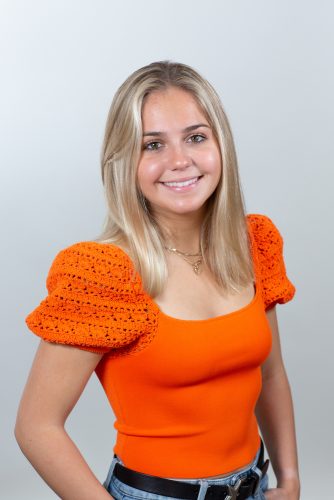
Hannah Helfrich saved a man’s life by performing CPR. Photo by Carolyn Cruz
One man was on the phone with a 911 operator while the other was attempting CPR. His technique was wrong. I sang “Stayin’ Alive” to demonstrate the proper rhythm for compressions to no avail. As the unconscious man turned greenish-yellow, I knew I had to act.
“This experience changed my perspective on pressure: It is a motivator, not something to be feared. I learned that I can perform at my peak when under duress, and this knowledge has helped me overcome challenges.
Hannah Helfrich
Kneeling over the lifeless man, I searched for a nonexistent pulse. I started chest compressions and ordered one of the men to give mouth to mouth on my count. After multiple rounds of compressions, I remembered an essential part of CPR and instructed someone to open the man’s airway.
Almost instantly, the unconscious man’s eyes came to life. He started coughing and regained consciousness. The sight was indescribable. After the paramedics arrived, they explained that the man went into cardiac arrest due to a drug overdose.
I had made a judgment call that ended positively. Though hesitant at first, I had felt pressure to do the right thing, which pushed me to recall my CPR training, to step out of my comfort zone. Those decisions saved someone’s life.
This experience changed my perspective on pressure: It is a motivator, not something to be feared. I learned that I can perform at my peak when under duress, and this knowledge has helped me overcome challenges. I have improved my grades; I am able to think on my feet, and I am resourceful during complicated situations. I’m certain I will thrive in college because I now know how to respond when confronted with pressure. I see it as an opportunity to do better.
JAMES BOYD
Entrepreneurship and Innovation
Spartanburg, South Carolina
Last year, a conversation with my cousin led to my taking a 3,218-mile bike ride across the United States.
My cousin and I were talking about doing something different and interesting over summer vacation. A few weeks later, I signed up for the American Challenge bike trip and started training.
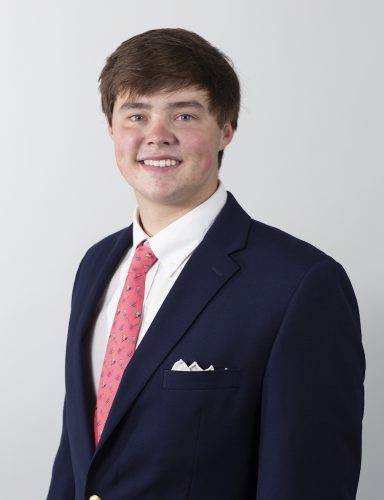
James Boyd participated in the American Challenge, biking 3,218 miles across America to raise money for a nonprofit that assists families in his hometown of Spartanburg, South Carolina. Photo by Carolyn Cruz
Last June, I left Tybee Island, Georgia, with 13 strangers for a 3,218-mile bike trip that would end in August in Santa Monica, California. Those six weeks would challenge me mentally and physically in ways I could not have imagined. During 11 of those summer days, my group rode more than 100 miles. Carrying 60 pounds of gear, we climbed an 11,000-foot peak in the Rocky Mountains and rode 220 miles through the Mojave Desert.
I used the trip to raise money for a nonprofit called Total Ministries, which assists families in need in my hometown of Spartanburg, South Carolina. My parents wrote me midway through the ride to say we had raised $20,000 in pledges. Total Ministries was going to use the money for rental assistance for families in need.
I then understood that my bike trip would help a lot of people. I was motivated to finish the trip no matter how hard the ride became. In the Mojave, a support van trailed us for three days because the temperature was 121 degrees. Almost everyone in the group got in the van, but I pressed on.
I didn’t want to tell the people at Total Ministries that I had almost biked across America. I wanted to ride every single mile for the families who needed help. Arriving at the Santa Monica Pier to swim in the Pacific Ocean on the final day was an awesome feeling.
The American Challenge bike trip taught me two things: First, I can do anything if I focus on my goals. Second: A person can make a real difference in the lives of others. I ended up raising more than $30,000 for Total Ministries. That money helped more than 50 families stay in their homes.
KATIE JANNUSCH
Nursing
Cary, Illinois
*This letter is addressed to a nurse I never met.
Dear Maddie,
I know you know the story. I know you know the damage our shared experience did to my family. I know you know the pain of watching a baby die.
What you don’t know is how you saved my parents, my family and me. The day that Ally died, my parents were devastated and confused. They needed answers, but the OB/GYN was silent; the geneticist didn’t have answers. You were the voice that carried my parents through the death of their first child. You were the person who stood by my mom’s side as my sister took her last breath, and you were the person who assured my parents that life could go on.
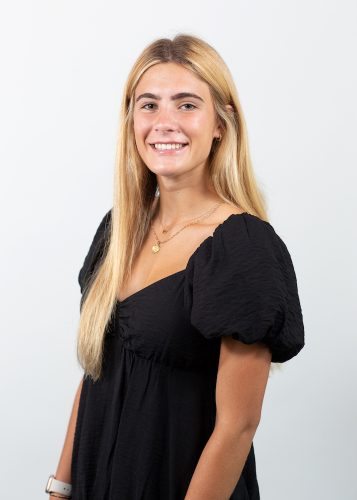
Katie Jannusch wrote to a nurse she never met: “You saved my life by helping my parents cope, but you also saved my life by giving me a role model.”
No one had answers for why Ally died, just suspicions: “The umbilical cord was wrapped around her neck.” “She had an esophageal fistula.” “There was a genetic problem.”
Words and more words filled Ally’s medical documents, but all the words were followed by question marks.
You were the one who finally pulled my parents aside to talk. You warned them that Ally was going to die, but you helped them enjoy their time together. The geneticist warned them that this tragedy could happen to another of their children should they have more. You found the strength to encourage them to keep trying for kids. You explained that in all your years as a neonatal nurse, you could attest that cases like Ally’s are extremely rare.
You gave my parents the courage to pursue their family dreams, and because of your advice, I am alive.
You impacted my parents’ lives so much that the first child they had after Ally was named Maddie. My sister carries on your name, but I want to carry on what your name represents to my family. I want to carry on the strength you showed my parents and the kindness you gave as you talked them through their grief.
You are the person who made me want to pursue a career in nursing so that I could be the “Maddie” for another family. I want to save lives, but if I can’t, I want to be there for families like you were for mine.
You may not think you are a superhero because you couldn’t save Ally, but in my house you are. You hold this status because you were honest and compassionate. You had the strength to tell the truth when it was needed.
When I am a nurse, I will carry on that same strength.
Maddie, you saved my life by helping my parents cope, but you also saved my life by giving me a role model. You are the reason that someday I am going to be a strong, compassionate, honest and hardworking nurse. I cannot thank you enough for that.
With Gratitude,
Katie Jannusch

Your comments are welcome
1 Comment
These are the type young people who will save our country and, in turn, the world.
Related reading:
A Servant Leader
Chancellor William Tucker’s careful eye toward the future prepared TCU for its transformation into a top national university.
Caring for the Whole Student
TCU’s Counseling & Mental Health Center supports students in innovative ways.